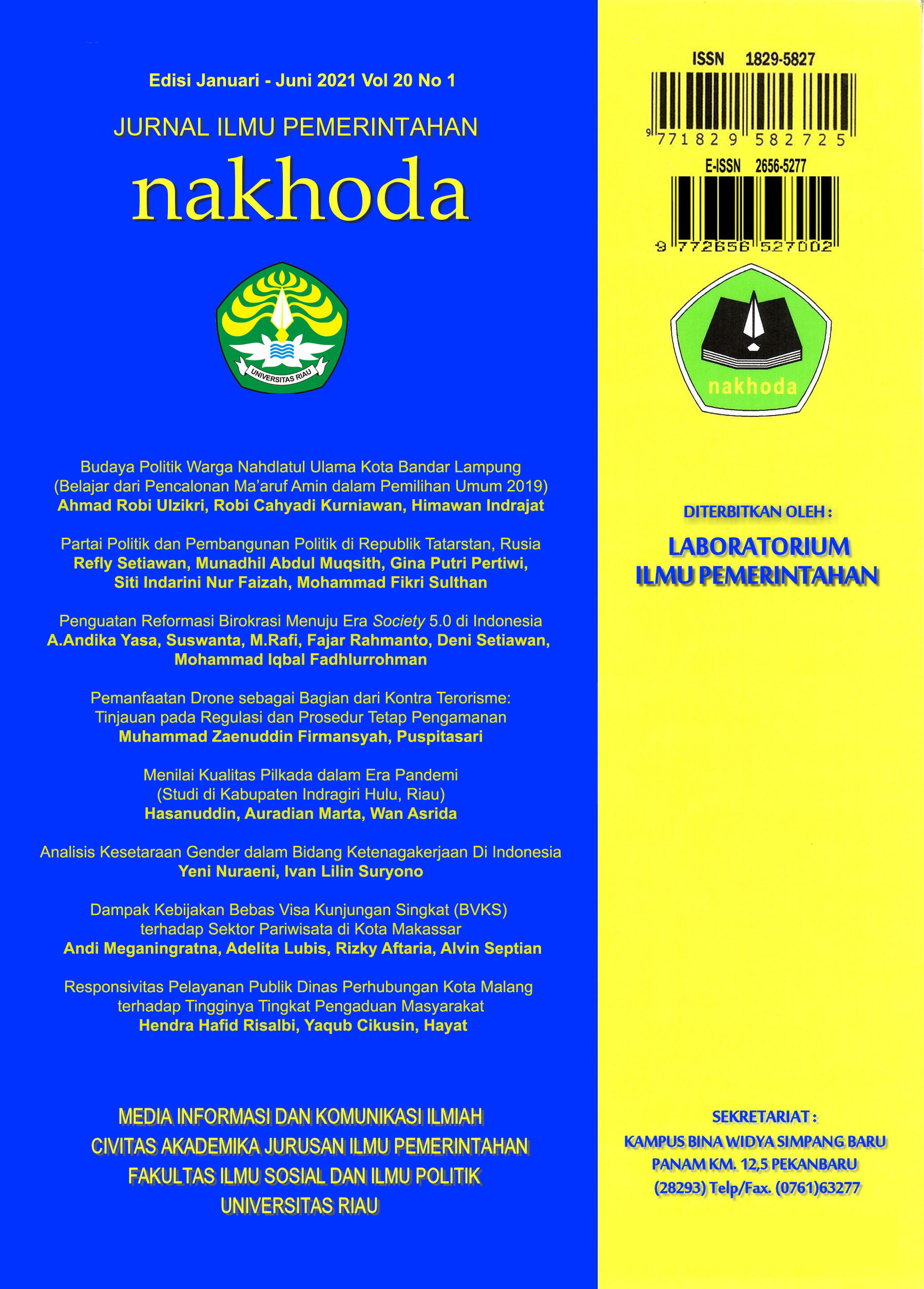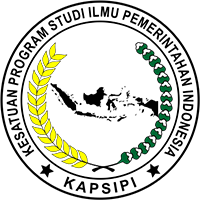Strengthening Bureaucratic Reform Towards Society 5.0 Era in Indonesia
DOI:
https://doi.org/10.35967/njip.v20i1.139Keywords:
Bureaucratic Reform, Human Resources Apparatus, Society 5.0Abstract
Entering the era of society 5.0, the use of technology has begun to consider the humanities aspects of the problem-solving process in the public sector. Therefore, this study aims to determine the efforts to strengthen bureaucratic reform towards the era of society 5.0 through the governance of human resource development planning by the Ministry of State Apparatus Utilization and Bureaucratic Reform. Then, this study uses qualitative research methods with secondary data collection from previous references such as books, journals, and public documents related to the research focus and analyzed using NVivo12 Plus software with a Cluster Analysis approach. The findings of this study indicate that the Ministry of State Apparatus Utilization and Bureaucratic Reform has strengthened bureaucratic reform through a merit system-based planning governance, where at the stages of recruitment, appointment, and promotion, an examination is carried out on the level of expertise and competence of each apparatus that meets the job requirements while taking into account the aspects of integrity and morality. However, strengthening bureaucratic reform towards the era of society 5.0 in Indonesia has encountered various obstacles related to the still-dominant bureaucratic pathology, a culture of corruption, and the unpreparedness of the bureaucracy for the use of technology and information in the orientation of public services to the community. Therefore, the planning for human resource development by Ministry of State Apparatus Utilization and Bureaucratic Reform in strengthening bureaucratic reform towards the Society 5.0 era must be carried out appropriately by responding to various obstacles that occur as well as all forms of environmental change and development of the times.
Downloads
References
Agus. (2019). Patologi Birokrasi dan Agenda Strategi: Kolaborasi Pendekatan New Public Management dan New Public Service Melalui Model Melalui Model Citizen`s Charter. POLITEA?: Jurnal Kajian Politik Islam, 2(1), 77–90.
Arief, N. N., & Saputra, M. A. A. (2019). Kompetensi Baru Public Relations (PR) Pada Era Artificial Intelligence. Jurnal Sistem Cerdas, 2(1), 1–12. https://doi.org/10.37396/jsc.v2i1.19
Azhary, V. H. (2019). Nepotisme Dan Gratifikasi Sebagai Unsur Budaya Pada Korupsi Politik Dan Birokrasi Di Indonesia. Simposium Nasional Ilmiah Dengan Tema: (Peningkatan Kualitas Publikasi Ilmiah Melalui Hasil Riset Dan Pengabdian Kepada Masyarakat), 754–762. https://doi.org/10.30998/simponi.v0i0.437
Bandur, A. (2019). Penelitian Kualitatif, Studi Multi-Disiplin Keilmuan dengan NVivo 12 Plus (Edisi Pertama). Jakarta: Mitra Wacana Media.
Faedlulloh, D., Yulianto, & Karmilasari, V. (2019). Bureaucratic Reform in the Second Period: Promoting Agenda for Structural Reform and Mindset. LPPM Unila-Institutional Repository. Retrieved from http://repository.lppm.unila.ac.id/id/eprint/15253
Fajriah, U. R., & Razak, M. R. R. (2020). Pengaruh Perilaku Birokrasi Terhadap Pelayanan Publik Di Desa Timoreng Panua Kecamatan Panca Rijang Kabupaten Sidenreng Rappang. Jurnal Praja, 8(1), 48–56.
Farida, A. (2019). Studi Pustaka tentang Perkembangan Teknologi dan Peningkatan Kepatuhan Pajak: Apakah Berbanding Lurus? Moneter - Jurnal Akuntansi dan Keuangan, 6(2), 135–140. https://doi.org/10.31294/moneter.v6i2.6183
Faruqi, U. Al. (2019). Future Service in Industry 5.0. Jurnal Sistem Cerdas, 2(1), 67–79. https://doi.org/10.37396/jsc.v2i1.21
Gumilang, G. S. (2016). Metode Penelitian Kualitatif Dalam Bidang Bimbingan Dan Konseling. Jurnal Fokus Konseling, 2(2), 144–159.
Hadi, K. (2016). Korupsi Birokrasi Pelayanan Publik Di Era Otonomi Daerah. Jurnal Penelitian Politik, 51–70. Retrieved from ejournal.lipi.go.id
Haning, M. T. (2018). Reformasi Birokrasi di Indonesia: Tinjauan Dari Perspektif Administrasi Publik. Jurnal Analisis Kebijakan Dan Pelayanan Publik, 4(1), 25–37. Retrieved from journal.unhas.ac.id/index.php/jakpp
Hartanto, D. (2019). Kajian Wilayah Birokrasi Bersih dan Melayani Kepolisian Resort Kota Medan. PUBLIKAUMA: Jurnal Ilmu Adminstrasi Publik, 7(2), 71–87. https://doi.org/DOI: http://dx.doi.org/10.31289/publika.v7i2.2805
Hasan, N. (2012). Corak Budaya Birokrasi Pada Masa Kerajaan, Kolonial Belanda Hingga Di Era Desentralisasi Dalam Pelayanan Publik. Jurnal Hukum, 28(2), 1073–1087.
Henriyani, E. (2017). Menumbuhkan Budaya Birokrasi Yang Inovatif Dan Berdaya Saing Global. 6–10.
Hidayat, E. S. (2019). Kinerja Pelayanan Birokrasi Dalam Mewujudkan Kepuasan Pelanggan. Dinamika: Jurnal Ilmiah Ilmu Administrasi Negara, 6(2), 43–49. https://doi.org/DOI: http://dx.doi.org/10.25157/dinamika.v6i2.2260
Islah, K. (2018). Peluang Dan Tantangan Pemanfaatan Teknologi Big Data Untuk Mengintegrasikan Pelayanan Publik Pemerintah. Jurnal Reformasi Administrasi, 5(1), 130–138.
Karningsih. (2019). Demokratisasi Pelayanan Publik Di Indonesia. Mimbar Administrasi, 15(29), 60–72.
Kurniati, P. N., & Nugroho, B. Y. (2019). The Urgency of the Implementation of the Cashless Government System in Building a Transparent and Accountable Bureaucracy. Jurnal Administrasi Publik, 9(2), 136–150. https://doi.org/DOI: http://dx.doi.org/10.31289/jap.v9i2.2655
Maizunati, N. A. (2018). Implementasi Data Sektoral Terbuka Dalam Mendukung Smart Governance Di Kota Magelang. Journal of Public Administration and Local Governance, 2(2), 31. https://doi.org/10.31002/jpalg.v2i2.1082
Mardawani, & Relita, D. T. (2019). Strategi Pemerintah Daerah Kabupaten Sintang Dalam Mewujudkan Visi Pemerintahan Dan Good Governance. Jurnal Ilmiah Pendidikan Pancasila Dan Kewarganegaraan, 4(1), 109–116. Retrieved from http://journal2.um.ac.id/index.php/jppk
Moleong, L. J. (2012). Metodologi Penelitian Kualitatif. Bandung: PT. Remaja Rosdakarya.
Nashihuddin, W., & Suryono, F. (2018). Tinjauan Terhadap Kesiapan Pustakawan dalam Menghadapi Disrupsi Profesi di Era Library 4.0: Sebuah Literatur Review. Khizanah Al-Hikmah?: Jurnal Ilmu Perpustakaan, Informasi, Dan Kearsipan, 6(2), 86. https://doi.org/10.24252/kah.v6i2a1
Nasution, D. A. D., Nasution, A. P., & Alpi, M. F. (2019). Pengaruh Penerapan Smart ASN Terhadap Pengelolaan Keuangan Negara di Era Disrupsi Teknologi Indonesia 4.0. Seminar Nasional Sains & Teknologi Informasi, 43–51.
Nurhasanah, & Yusnalia. (2019). Bureaucratic Pathology Study In Administrative Services Of The Population In Jekan Raya District Office Of Palangka Raya City. Pencerah Publik, 6(1), 1–10. Retrieved from http://journal.umpalangkaraya.ac.id/index.php/pencerahstudi
Parjaman, T., Soedarmo, U. R., & Enas. (2019). Penguatan Kapasitas Aparatur Untuk Meningkatkan Daya Saing Daerah Di Era Global. Journal of Management Review, 1, 29–42. https://doi.org/http://dx.doi.org/10.25157/mr.v3i3.2869
Purwaningsih, A. S., Afifuddin, & Abidin, A. Z. (2019). Reformasi Birokrasi Pelayanan Publik Dalam Meningkatkan Kualitas Pelayanan Publik Studi Kasus Pada Pelayanan Kartu Keluarga Di Dinas Kependudukan Dan Pencatatan Sipil Kabupaten Malang. Jurnal Respon Publik Volume, 13(4), 82–86.
Rahadian, A. . (2019). Revitalisasi Birokrasi Melalui Transformasi Birokrasi Menuju E-Governance Pada Era Revolusi Industri 4.0. Prosiding Seminar Stiami, 6(1), 85–94.
Rivai, F. H. (2019). Bureaucracy Culture Enforcement To Encounter Industrial Revolution 4.0. Jurnal Transformasi Administrasi, 9(2), 128–138.
Rustandi. (2019). Kinerja Manajemen Sumber Daya Manusia Di Era Disrupsi. Kebijakan: Jurnal Ilmu Administrasi, 10(2), 67–73.
Sakti, B. (2019). Kompetensi Aparatur Pemerintah Daerah Dalam Sumber Daya Manusia Di Era Reformasi. Pareto?: Jurnal Ekonomi Dan Kebijakan Publik, 2(1), 35–44.
Salgues, B. (2018). Society 5.0 Industry of the Future, Technologies, Methods and Tools. London: ISTE Ltd.
Saluky. (2018). Tinjauan Artificial Intelligence untuk Smart Government. ITEJ (Information Technology Engineering Journals), 03(01).
Setiawan, A., & Fauzi, E. A. (2019). Etika Kepemimpinan Politik Dalam Penyelenggaraan Pemerintahan Indonesia. JPK: Jurnal Pemerintahan Dan Kebijakan, 1(1), 1–12.
Sihite, M. (2018). Peran Kompetensi Dalam Mewujudkan Sumber Daya Manusia Yang Berdaya Saing Tinggi Di Era Revolusi Industri 4.0: Suatu Tinjauan Konseptual. Jurnal Ilmiah Methonomi Volume, 4(2), 145–159.
Sirih, S. H., Ismail, I., & Juharni. (2019). Development Strategies Of Human Resources In BKPSDM Majene District. Jurnal Paradigma, 1(2), 1–6.
Soekarsono, R. (2019). Merubah Mindset Asn Menjadi Disruptive Mindset Sebagai Faktor Penentu Suksesnya Implementasi Industri 4.0 Di Indonesia. Prosiding Seminar Stiami, 6(1), 67–84.
Suwardana, H. (2018). Revolusi Industri 4. 0 Berbasis Revolusi Mental. JATI UNIK?: Jurnal Ilmiah Teknik Dan Manajemen Industri, 1(2), 102–110. https://doi.org/10.30737/jatiunik.v1i2.117
Umam, M. K. (2019). Dimensi Kepemimpinan Transformatif Era Disrupsi Perspektif Manajerial Birokrasi. Al-Wijdán: Journal of Islamic Education Studies, 4(2), 126–146. https://doi.org/10.1017/CBO9781107415324.004
Wardani, A. K. (2019). Urgensi Inovasi Pelayanan Bidang Administrasi Publik Di Era Disrupsi. Dinamika: Jurnal Ilmiah Ilmu Administrasi Negara, 6(2), 30–35. https://doi.org/DOI: http://dx.doi.org/10.25157/dinamika.v6i2.2258
Wasitarini, D. E. (2019). Perpustakaan Satu Data ( One Data Library ). Jurnam Madika, 5(2), 26–39.
Yudoprakoso, P. W. (2019). Kecerdasan Buatan (Artificial Intelligence) Sebagai Alat Bantu Proses Penyusunan Undang-Undang Dalam Upaya Menghadapi Revolusi Industri 4.0 Di Indonesia. Simposium Hukum Indonesia, 1(1), 450–461.
Yuhefizar, Sanjani, H., & Chadri, R. (2019). Penerapan Sistem Pemerintahan Berbasis Elektronik (E-Government) Dengan Pendekatan Bottom-Up Berbasis Web Di Sumatera Barat. Prosiding Seminar Nasional Multidisiplin Ilmu, 2(1), 303–309.
Zaenuri, M. (2015). Manajemen SDM di Pemerintahan (Edisi 1). Yogyakarta: LP3M UMY.
Downloads
Published
How to Cite
Issue
Section
License
Copyright (c) 2021 Authos(s)

This work is licensed under a Creative Commons Attribution-NonCommercial-ShareAlike 4.0 International License.





